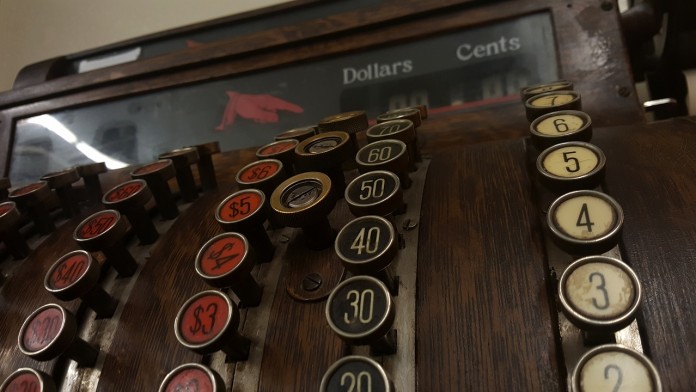“If I go out of town to buy, and you go out of town to buy, and our neighbors go out of town to buy, what will become of our town, our children, our homes, schools and churches?”
— taken from full-page advertisement in Jeromesville school yearbook, 1924, Fickes and Winbigler furniture, ambulance, mortician company
Part one
Those passing by would have thought the three women had just stumbled upon a treasure chest filled with gold nuggets. Instead, the happiness was over a robin’s egg blue school yearbook, Wyando from 1924.
This great find remains in excellent condition in Eldora Sigler Starlin’s collection from her mother’s keepsakes.
The photographs include long-gone friends and family members in surprisingly crisp black and white group pictures, with only the graduating senior class members given individual photographs.
The class of ’24 “is the largest to graduate in the history of our school, consisting of 13 members — 8 girls and 5 boys.”
Basketball
The high school basketball team was first organized by school superintendent Professor E. Clippinger. “Goals were put up on the school ground and the boys soon entered into the spirit of the new game.”
The next year, six young men returned to “report to work.” The young team members struggled to find places to practice and play “with a good floor.”
Through the “kindness of Mr. Bruce Glenn we were able to practice on his barn floor” and the skills of this new sport improved. “It is hoped that a gym will soon be provided in order that J.H.S. may make a better showing.”
Economy
The advertisements in the back of this slim yearbook are what captivated me the most.
Jeromesville, like nearly every established village at the time, was thriving. The town had a Chevrolet dealership, as well as a motor car company which carried a “full line of Ford cars and Fordson tractors.”
A hat shop for ladies, a gentleman’s haberdashery, a jeweler, a general boot and shoe repair shop, a real estate business, drug store, meat market, a hotel (“with rooms and a bath”), a lumber and general elevator, and a thriving hardware with an enormous list of services and products are just a few of the village businesses taking out ads in the school yearbook.
Foreign floor
Plank Milling Company’s full page ad made us think.
“A dollar spent for Faultless, Jerome Fork or Planks Cream flour is a one hundred percent investment.”
The ad explains in small print, “The wheat from which these are made is the product of your own farms, and the flours from this wheat comes back to your farms with the least possible expense; nothing to add for freight, or expense added to keep the army of men engaged in handling and transporting grain and flour from place to place.”
Any flour not produced in the immediate community was labeled “foreign flour” and local citizens and farmers were urged to both sell and buy locally.
If not, “you are buying the product of some one’s else farm, perhaps even outside the state.”
Service with individual attention to meet personal needs is stressed. The mill handled a complete line of poultry and dairy feeds, concentrates, salt and fertilizer.
“See us before buying” the ad urges. “Buy local” is repeated in various advertisements. We have come full circle, where once again “buy local” is given respect.
What a shame that far too many years passed in which not enough thought was given to the importance of that which kept our communities, schools and businesses strong, and in the grand scheme of things, helped keep families close.
The rest of the series
- Part two: Roots run deep in the community
- Part three: Rural people known by nicknames
- Part four: Growing up small-town proved invaluable for our ancestors













